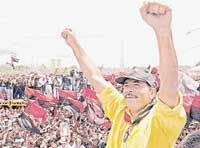Nicaragua: Excesses of Capitalism boost presidential bid of former guerrilla leader
Daniel Ortega, the head of the Sandinista Marxist rebels that ruled the country between 1979 and 1990, leads presidential race ahead of Sunday election.

Former revolutionary leader Daniel Ortega was close to come back to power in Nicaragua after 16 years of pro-Washington conservative governments, according to opinion polls published by the local media ahead of Sunday’s presidential vote. Ortega, who chaired the leftist government of the Sandinista National Liberation Front -fiercely battled by US trained and financed Contra rebels- was close to obtain the 35 percent of the vote and the 5-point lead needed to avoid a runoff with conservative Eduardo Montealegre, according to these polls.
"Today another revolution is taking place," Ortega told cheering supporters at his final rally in Managua on Wednesday. "A revolution that will get you out of poverty." Ortega also talks about a spiritual revolution based on the “peace and love” slogans of the seventies.
According to observers, a Sandinista win would likely irk U.S. President George W. Bush, whose father, then president, celebrated the end of Ortega's decade-long rule in 1990. It would also mark a victory for President Hugo Chavez of Venezuela, US enemy number one in Latin America, who has openly backed Ortega’s bid.
Ortega has benefited from extraordinary circumstances all along the presidential campaign. At first, the death of former Managua Mayor Hearty Lewites, who was favorite to succeed incumbent president Enrique Bolanos. This center-left Sandinista dissident challenged Ortega’s leftist credentials blaming on him on corruption and secret ties with the pro-Washington administrations in the nineties.
Ortega’s unexpected comeback also came thanks to the split in the ruling Liberal Party. Montealegre’s candidature has been permanently shattered by former fellow Liberal Jose Rizo, who is backed by former president Arnoldo Aleman (1997 – 2002), sentenced to 20 years in prison for corruption. Sandinista dissidents said Ortega betrayed the once idealistic movement after the notorious “el pacto” he reached in 2001 with corrupt Aleman. This bargain divvied up power between the Liberals and the Sandinistas in advance of Aleman's exit from office.
The controversial former revolutionary has also lost much of his popularity after allegations of sexual abuse by his stepdaughter in 1998. According to observer, he is very resisted by most of Nicaraguans, who could vote for any other candidate in an eventual runoff.
With the above in mind, liberals backed by Washington are trying to force a runoff, where a single conservative candidate has more chances to defeat Ortega and his die-hard supporters.
Since Ortega lost power in 1990, Nicaragua’s poverty rate jumped to 80% of the population and social standards fell fall below the Latin America media. Most Nicaraguans say years of pro-market reforms by governments favored by Washington have created a rich elite but done nothing to improve their lives. Many are angry over a series of corruption scandals.
On the other hand, Ortega’s detractors look with fear those years of civil war and radical policies under Sandinista rule. Now, older Ortega has little to do with the radical leader he used to be in the eighties. He has even obtained the support of prominent ex-Contra leaders who fought him at the time. Among them, Mr. Ortega's running mate is former Contra heavyweight Jaime Morales, whose mansion Ortega still lives in after seizing it in the 1979 Sandinista revolution that toppled the Somoza family dictatorship.
Hernan Etchaleco
Pravda.ru
Subscribe to Pravda.Ru Telegram channel, Facebook, RSS!





